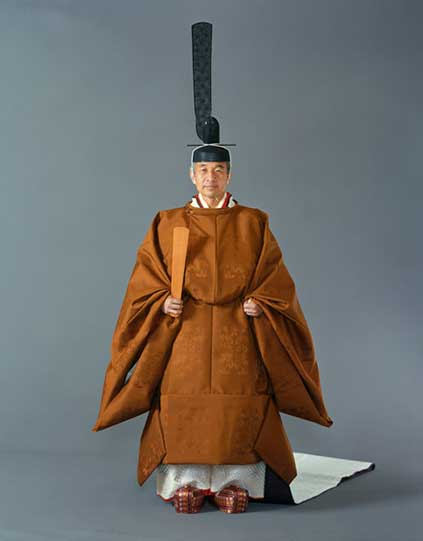
Emperor Akihito at the Ceremony of the Enthronement on November, 1990. Ministry of Foreign Affairs of Japan
The Emperor System in Japan. Origins, Evolution and the New Imperial Era – with William Horsley
- 23 May 2019
- 6:45pm
- The Swedenborg Society, 20-21 Bloomsbury Way (Hall entrance on Barter St), London WC1A 2TH
- https://www.japansociety.org.uk/event/william-horsley/
- 020 7935 0475
- events@japansociety.org.uk
- Tweet
Emperor Akihito’s abdication in favour of his son Crown Prince Naruhito has re-ignited a many-sided debate about the fundamental values of Japanese society and the state itself. Some commentators see Emperor Akihito’s attempt to modernise the image of the Imperial family and present a liberal face on peace and reconciliation issues as at odds with Prime Minister Abe’s desire to amend the postwar Constitution and assert Japan’s national interests more forcefully. Others see this as a more natural progression in line with that of other monarchies.
At this moment of transition to a new imperial era — Reiwa or ‘auspicious peace’ — William Horsley considers the evolution of the ‘emperor system’ from its early origins through the Meiji constitution’s designation of the emperor as ‘sacred and inviolable’, the Emperor-based propaganda of the Pacific war period and the establishment of a quasi-permanent conservative polity after Japan’s defeat in 1945. William will argue that the long, unbroken tradition of the Japanese monarchy has helped shape the distinctive characteristics of today’s nation – loyal respect for authority, the exercise of real power from behind-the-scenes, an apolitical society, and the enduring wish of some conservative nationalists to restore a more native Japanese value system.
William Horsley studied modern Japanese history under the respected historian Richard Storry and took a degree in Japanese Studies from Oxford University in 1971. He joined the BBC and from 1983-1990 worked as the BBC’s Tokyo correspondent and bureau chief, reporting on Japan’s meteoric rise as an economic superpower and numerous political scandals as well as political convulsions across East Asia, including the aftermath of the events of Tian An Men Square in 1989. Later he returned to Japan often for special coverage of World War Two anniversaries and to make programmes on the new challenges facing Japan: economic stagnation, an ageing society and the geo-political rise of China. William also reported widely from Europe for many years on the radical re-shaping of the continent in the wake of the Fall of the Berlin Wall. He left the BBC in 2007 and co-founded the Centre for Freedom of the Media at the University of Sheffield to counter threats to press freedom and freedom of expression worldwide. He is the UK chairman of the Association of European Journalists (AEJ) and the co-author, with Roger Buckley, of Nippon: New Superpower (BBC Books, 1990).
Please note this event is now fully booked.
To register for a place on the waiting list, please call the Japan Society office on 020 3075 1996 or email events@japansociety.org.uk.
This monthly lecture will be held on Thursday not Monday as usual. Venue and starting time remain unchanged.
